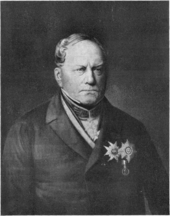Severin Løvenskiold
| Severin Løvenskiold | |
|---|---|
 |
|
| Governor-general of Norway | |
|
In office 1841–1856 |
|
| Monarch | King Oscar I |
| Preceded by | Herman Wedel-Jarlsberg |
| Succeeded by | Position abolished. |
| Prime Minister | |
|
In office 1828–1841 |
|
| Monarch | Karl III Johan |
| Preceded by | Mathias Sommerhielm |
| Succeeded by | Frederik Due |
| Personal details | |
| Born |
7 February 1777 Porsgrunn, Norway |
| Died | 15 September 1856 (aged 79) Gjerpen, Norway |
| Nationality | Norwegian |
| Occupation | Nobleman |
| Profession | Politician |
| Signature |  |
Severin Løvenskiold (7 February 1777 – 15 September 1856) was a Norwegian nobleman, politician and Prime Minister of Norway.
Severin Løvenskiold, the younger, was born in Porsgrunn in Telemark, Norway to Severin Løvenskiold, the elder, and Benedicte Henriette née Aall. In 1802, he married Countess Hedevig Sophie Knuth.
When Løvenskiold was nine years old, he was sent to Germany, where he received his formal education. After studies in Wandsbek near Hamburg, in Eutin, in Saxony and in Silesia, where he studied mining, he returned in 1794 at the age of 17 years. He earned a degree in law at the University of Copenhagen in 1796. After a few years of public service in Christiania, he assumed responsibility for some of the family’s holdings in 1802, at which time he was also made the King’s representative for his area.
After nine years as the Dano-Norwegian king’s representative, Severin Løvenskiold resigned this position in 1813, and in the following year, he was elected to the constitutional assembly at Eidsvoll. Løvenskiold was during the convention an enthusiastic member of the so-called ‘Union Party’, which advocated a union with Sweden, and he made notable efforts to retain the nobility in Norway. When noble titles and privileges in fact were abolished in a process starting with the Nobility Law of 1821, Løvenskiold went on record against the decision, finding it unjust and in violation with promises of eternal noble status in 1739 given from the king to his father, Severin Løvenskiold, the eldest.
His position against the dissolution of nobility is a good example of Løvenskiold’s position in many contemporary political issues. His conservatism, which sometimes could appear as reactionary, was reflected in his refusal of measures leading to a popular democracy, particularly so in 1836 when the laws on municipal democracy were sanctioned by the king—against Løvenskiold’s advice. He maintained that the peasants lacked the necessary level of education and political understanding to govern national affairs, a view the king in reality shared with him. However, King Charles III John accepted the municipal laws. Løvenskiold was very loyal to the King, and he was granted the position of prime minister in for several years until he was appointed governor of Norway in 1841.
...
Wikipedia
